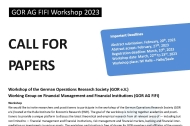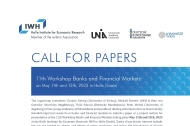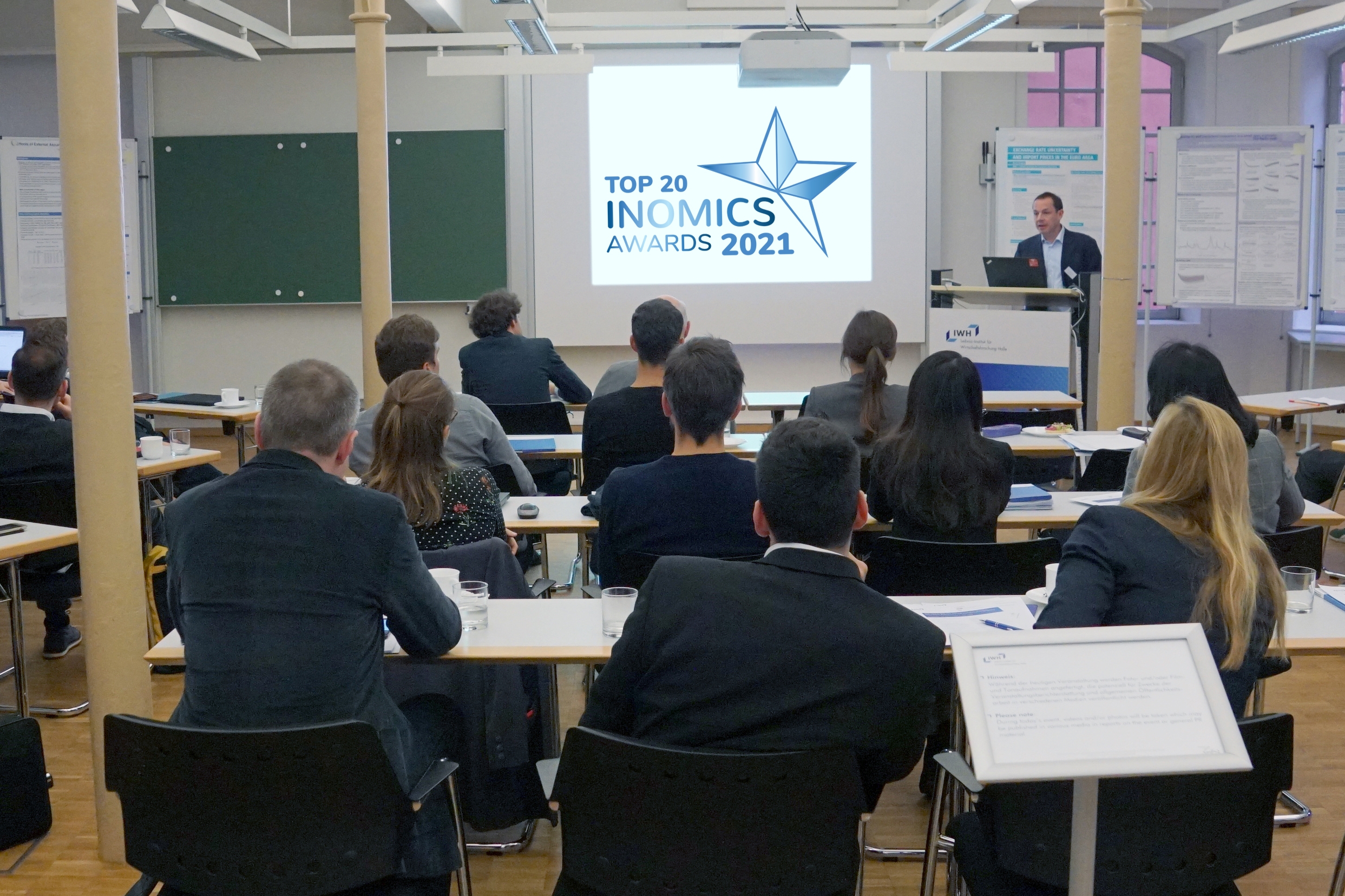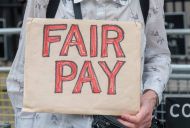
|
|
|

|
|

|
|
UPCOMING: Mittwoch, 22. und Donnerstag, 23. März 2023, IWH, Halle (Saale)
GOR AG FIFI Workshop 2023
We would like to invite researchers and practitioners to participate in the workshop of the German Operations Research Society (GOR e.V.) hosted at IWH to discuss the latest research from financial management and financial institutions, risk management and financial markets, banking and financial intermediation or investments in various assets.
|
|
|

|
|
UPCOMING: Donnerstag, 11. und Freitag, 12. Mai 2023, IWH, Halle (Saale)
11th Workshop Banks and Financial Markets
We invite young academics (PhD students and postdocs) dealing with theoretical or theoretically founded empirical research on banks and financial markets to submit a paper or a project outline for presentation at the 11th Workshop Banks and Financial Markets.
|
|
|

|
|
UPCOMING: Donnerstag, 8. und Freitag, 9. Juni 2023, Bank of Italy, Rome
3rd Finance and Productivity (FINPRO) Conference „Green Deal: Reformation, Evolution, and Revolution“
A conference jointly organised by the Bank of Italy, the Centre for Economic Policy Research (CEPR), the Competitiveness Research Network (CompNet), the European Bank for Reconstruction and Development (EBRD) and the IWH.
Keynote Speaker:
Philippe Aghion
(Insead, LSE and CEPR)
|
|
|

|
|
Mittwoch, 9. November 2022, ESMT Berlin/Zoom
Berlin Science Week 2022
Im Rahmen der Berlin Science Week 2022 diskutierten
Reint Gropp
(IWH) und
Jörg Rocholl
(ESMT Berlin) im Experten-Dialog zum Thema „Inflation: Welche politischen Maßnahmen sind möglich und nötig?“
Video der Veranstaltung ansehen
|
|

|
|
Montag, 28. und Dienstag, 29. November 2022, IWH, Halle (Saale)
IWH-CIREQ-GW Macroeconometric Workshop „Inflation: Modelling, Forecasting and Monetary Policy Reactions“
The workshop provided a platform to discuss new developments in the field of empirical and applied macroeconomic modelling and brought together academic researchers and practitioners.
Keynote Speakers:
Caterina Mendicino (European Central Bank),
Michael Bauer (University of Hamburg).
|
|
|
Alle IWH-Veranstaltungen
|

|
|
|

|
|
|
Journal of Corporate Finance
Local Product Market Competition and Bank Loans
Iftekhar Hasan, Y. Shen, X. Yuan
>>We investigate the influences of local product market competition on the cost of private debt. Our evidence suggests that the cost of bank loans is significantly higher for firms headquartered in states with greater local product market competition measured by the Herfindahl-Hirschman Index for resident industries. …<<
|
|

|
|
|
Journal of International Economics
Quid Pro Quo? Political Ties and Sovereign Borrowing
G. Ambrocio, Iftekhar Hasan
>>Do stronger political ties with a global superpower improve sovereign borrowing conditions? We use data on voting at the United Nations General Assembly along with foreign aid flows to construct an index of political ties and find evidence that suggests stronger political ties with the US is associated with both better sovereign credit ratings and lower yields on sovereign bonds especially among lower income countries. …<<
|
|

|
|
|
The Review of Economics and Statistics
Energy Markets and Global Economic Conditions
Christiane Baumeister, D. Korobilis, T. K. Lee
>>We evaluate alternative indicators of global economic activity and other market fundamentals in terms of their usefulness for forecasting real oil prices and global petroleum consumption. World industrial production is one of the most useful indicators. However, by combining measures from several different sources, we can do even better. …<<
|
|

|
|
|
American Economic Review: Insights
Immigration and Entrepreneurship in the United States
P. Azoulay, B. F. Jones, J. D. Kim, Javier Miranda
>>Immigrants can expand labor supply and compete for jobs with native-born workers. But immigrants may also start new firms, expanding labor demand. This paper uses US administrative data and other data sources to study the role of immigrants in entrepreneurship. …<<
|
|

|
|
|
Economic Inquiry
Firm-specific Forecast Errors and Asymmetric Investment Propensity
J. Berner, Manuel Buchholz, Lena Tonzer
>>This paper analyzes how firm-specific forecast errors derived from survey data of German manufacturing firms over 2007–2011 relate to firms' investment propensity. Our findings reveal that asymmetries arise depending on the size and direction of the forecast error. …<<
|
|

|
|
|
European Economic Review
Completing the European Banking Union: Capital Cost Consequences for Credit Providers and Corporate Borrowers
Michael Koetter, Thomas Krause, Eleonora Sfrappini, Lena Tonzer
>>The bank recovery and resolution directive (BRRD) regulates the bail-in hierarchy to resolve distressed banks in the European Union (EU). Using the staggered BRRD implementation across 15 member states, we identify banks' capital cost responses and subsequent pass-through to borrowers. …<<
|
|

|
|
|
Journal of Economic Dynamics and Control
Epidemics in the New Keynesian Model
M. S. Eichenbaum, S. Rebelo, Mathias Trabandt
>>This paper documents the behavior of key macro aggregates in the wake of the Covid epidemic. We show that a unique feature of the Covid recession is that the peak-to-trough decline is roughly the same for consumption, investment, and output. In contrast to the 2008 recession, there was only a short-lived rise in financial stress that quickly subsided. …<<
|
|

|
|
|
Journal of Economic Dynamics and Control
The Macroeconomics of Testing and Quarantining
M. S. Eichenbaum, S. Rebelo, Mathias Trabandt
>>We develop a SIR-based macroeconomic model to study the impact of testing/quarantining and social distancing/mask use on health and economic outcomes. These policies can dramatically reduce the costs of an epidemic. Absent testing/quarantining, the main effect of social distancing and mask use on health outcomes is to delay, rather than reduce, epidemic-related deaths. …<<
|
|

|
|
|
Journal of Public Economics
The Place-based Effects of Police Stations on Crime: Evidence from Station Closures
S. Blesse, André Diegmann
>>Many countries consolidate their police forces by closing down local police stations. Police stations represent an important and visible aspect of the organization of police forces. We provide novel evidence on the effect of centralizing police offices through the closure of local police stations on crime outcomes. …<<
|
|

|
|
|
The Journal of Human Resources
The Urban Wage Premium in Imperfect Labor Markets
Boris Hirsch, E. J. Jahn, A. Manning, M. Oberfichtner
>>Using administrative data for West Germany, we investigate whether part of the urban wage premium stems from greater competition in denser labor markets. We show that employers possess less wage-setting power in denser markets. Further, an important part of the observed urban wage premia can be explained by greater competition in denser labor markets. …<<
|
|

|
|
|
Alle IWH-Veröffentlichungen
|

|
|
|

|
|
|
IWH-Diskussionspapiere Nr. 21/2022
Corporate Governance Benefits of Mutual Fund Cooperation
R. W. Renji, P. Verwijmeren, Shuo Xia
|
|
|
IWH-Diskussionspapiere Nr. 22/2022
The Color of Corporate Loan Securitization
Isabella Müller, Huyen Nguyen, T. Nguyen
|
|
|
IWH-Diskussionspapiere Nr. 23/2022
Trading away Incentives
Stefano Colonnello, G. Curatola, Shuo Xia
|
|
|
IWH-Diskussionspapiere Nr. 24/2022
Firm Subsidies, Financial Intermediation, and Bank Stability
Aleksandr Kazakov, Michael Koetter, Mirko Titze, Lena Tonzer
|
|
|
IWH-Diskussionspapiere Nr. 25/2022
Bitcoin Flash Crash on May 19, 2021: What Did Really Happen on Binance?
T. Baumgartner, Andre Guettler
|
|
|
IWH-Diskussionspapiere Nr. 26/2022
Real Estate Transaction Taxes and Credit Supply
Michael Koetter, Philipp Marek, Antonios Mavropoulos
|
|
|
IWH-Diskussionspapiere Nr. 27/2022
Where to Go? High-skilled Individuals' Regional Preferences
Sabrina Jeworrek, Matthias Brachert
|
|
|
IWH-Diskussionspapiere Nr. 28/2022
Automation with Heterogeneous Agents: The Effect on Consumption Inequality
Tommaso Santini
|
|
|
Alle IWH-Diskussionspapiere
|

|
|
|

|
|
|
IWH-Pressemitteilung 23/2022
Gemeinschaftsdiagnose Herbst 2022: Energiekrise: Inflation, Rezession, Wohlstandsverlust
>>Die krisenhafte Zuspitzung auf den Gasmärkten belastet die deutsche Wirtschaft schwer. Die stark gestiegenen Gaspreise erhöhen die Energiekosten drastisch und gehen mit einem massiven gesamtwirtschaftlichen Kaufkraftentzug einher. Trotz eines Rückgangs in der zweiten Jahreshälfte dürfte das Bruttoinlandsprodukt in diesem Jahr um 1,4% ausgeweitet werden. Für das Jahr 2023 erwarten die Institute im Jahresdurchschnitt einen Rückgang um 0,4%, für das Jahr 2024 einen Anstieg um 1,9%. …<<
|
|
|
IWH-Pressemitteilung 24/2022
Die ostdeutsche Wirtschaft hat im ersten Halbjahr 2022 kräftig expandiert, gerät im zweiten Halbjahr aber in die Rezession
Implikationen der Gemeinschaftsdiagnose Herbst 2022 und jüngerer Veröffentlichungen des Arbeitskreises Volkswirtschaftliche Gesamtrechnungen der Länder
>>Die Energiekrise stürzt die deutsche Wirtschaft in eine Rezession. Das betrifft auch die Konjunktur in Ostdeutschland. In diesem Jahr wird die ostdeutsche Produktion laut Prognose des IWH mit 1,5% etwas stärker expandieren als in Deutschland insgesamt. Für das kommende Jahr dürfte der Rückgang in Ostdeutschland mit 0,1% weniger deutlich ausfallen als im Westen (Deutschland: 0,4%). Für das Jahr 2024 wird ein Zuwachs von 1,7% prognostiziert (Deutschland: 1,9%). …<<
|
|
|
IWH-Pressemitteilung 25/2022
IWH-Insolvenztrend: Zahl der Firmenpleiten weiter steigend
>>Die Zahl der Insolvenzen von Personen- und Kapitalgesellschaften liegt im September 34% über dem Vorjahreswert, zeigt die aktuelle Analyse des IWH. Für den Herbst ist mit weiter zunehmenden Insolvenzzahlen zu rechnen. …<<
|
|
|
IWH-Pressemitteilung 26/2022
IWH-Insolvenztrend: Weniger Firmenpleiten im Oktober
>>Die Zahl der Insolvenzen von Personen- und Kapitalgesellschaften war im Oktober im Vergleich zum Vormonat leicht rückläufig, zeigt die aktuelle Analyse des IWH. Für die kommenden Monate ist jedoch wieder mit steigenden Insolvenzzahlen zu rechnen. …<<
|
|
|
IWH-Pressemitteilung 27/2022
Deutsche Industrie kann Gasverbrauch um ein Viertel senken ohne große Umsatzeinbußen
>>Eine kleine Minderheit von Produkten verursacht bei ihrer Herstellung einen Großteil des Gasverbrauchs der Industrie. Viele könnten relativ leicht durch Importe ersetzt werden, zeigt eine Analyse des IWH für das Jahresgutachten der Wirtschaftsweisen. Ein Industriezweig ist besonders betroffen. …<<
|
|
|
IWH-Pressemitteilung 28/2022
Strengere Regeln für Banken können Immobilienmärkte entlasten
>>Schwierigkeiten auf dem deutschen Immobilienmarkt könnten eine Wirtschaftskrise weiter verschärfen. Der Staat hat zu wenig Einfluss, um diese Gefahr einzudämmen, zeigt eine IWH-Studie. …<<
|
|
|
IWH-Pressemitteilung 29/2022
IWH-Insolvenztrend: Trotz Anstieg im November weiter keine Dramatik bei Firmenpleiten
>>Die Zahl der Insolvenzen von Personen- und Kapitalgesellschaften ist im November im Vergleich zum Vormonat leicht angestiegen, zeigt die aktuelle Analyse des IWH. Damit verharrt das Insolvenzgeschehen jedoch vorerst weiter auf niedrigem Niveau. …<<
|
|
|
IWH-Pressemitteilung 30/2022
Ökonomen prüfen Wirkung der Kohlemilliarden
>>Mit rund 40 Milliarden Euro unterstützt der Bund drei große Braunkohlereviere und weitere zehn Regionen mit Steinkohlekraftwerken, die den Ausstieg aus der Kohleverstromung verkraften müssen. Wird das Geld sinnvoll genutzt? Das untersuchen die beiden Leibniz-Institute für Wirtschaftsforschung in Halle und Essen, IWH und RWI, in einer großen Evaluierung. …<<
|
|
|
IWH-Pressemitteilung 31/2022
Konjunktur aktuell: Keine tiefe Rezession trotz Energiekrise und Zinsanstieg
>>Die hohen Energiepreise und die Verschlechterung des Finanzierungsumfelds belasten die deutsche Konjunktur. Allerdings dürfte die Schwächephase über den Winter moderat ausfallen, auch weil die Energiepreisbremsen die privaten Einkommen stützen. Das IWH prognostiziert, dass das Bruttoinlandsprodukt im Jahr 2022 aufgrund der Erholung von der Pandemie in den ersten drei Quartalen um 1,8% zugenommen haben, den Winter über aber leicht sinken und im Jahr 2023 insgesamt stagnieren dürfte (Ostdeutschland: 1,8% und 0,2%). Die Inflation geht nach 7,8% im Jahr 2022 auf 6,5% im Jahr 2023 zurück. …<<
|
|
|
Alle IWH-Pressemitteilungen
|

|
|
|

|
|
|
|
Unser diesjähriges Weihnachtsmotiv zeigt, womit sich das Institut im Jahr 2022 schmücken durfte. Das IWH wünscht allen Leserinnen und Lesern des Newsletters „Wirtschaft im Wandel“ ein frohes Weihnachtsfest sowie ein friedliches Jahr 2023!
|
|

|
|
|
Impressum
Leibniz-Institut für Wirtschaftsforschung Halle
(IWH)
Kleine Märkerstraße 8
D-06108 Halle (Saale)
Tel +49 345 7753 60
www.iwh-halle.de
| Vorstand: |
Vertretungsberechtigter
Vorstand: Professor Reint E. Gropp, Ph.D.,
Professor Dr. Oliver Holtemöller,
Professor Michael Koetter, Ph.D.,
Dr. Tankred Schuhmann, Anschrift wie oben |
| Registergericht: |
Vereinsregister Stendal,
Vereinsregisternummer 21103 |
|
|
|
|